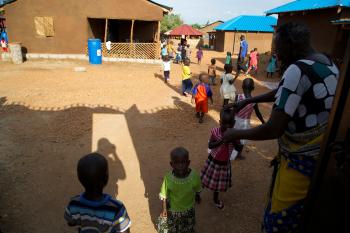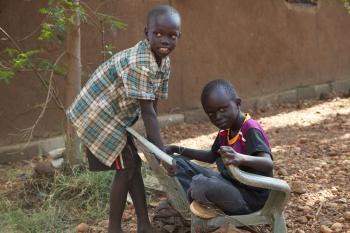People fled violence and arrived in Juba in search of safety

Juba is located in the south of South Sudan, near the border with Uganda and the Democratic Republic of Congo. It is the country’s biggest city and became the capital after South Sudan became independent in 2011.
After independence, hundreds of thousands of South Sudanese refugees and displaced people returned to their home country. However, most of them no longer owned property in South Sudan, so shelter and assistance in rebuilding their livelihoods were urgently required.
Political instability has continued in recent years, this has included fighting between government forces and rebels, especially in the border regions. Many people have fled hundreds of kilometres to safety in the south of the country. It is estimated that about 1.4 million people have been internally displaced .
As the political crisis worsened, and with attempts at a peace settlement still ongoing, international aid agencies warned of the worsening food crisis and threat of famine. In a country where acute malnutrition among children is already a problem, the lack of stability will lead to further suffering.
Our work in the country has also been affected by the fighting
SOS Children’s Villages started working in Juba in spring 2014. As the fighting in the north of the country worsened, the SOS families living in SOS Children’s Village Malakal were forced to leave their homes in search of safety. Initially most families went to the UNMISS (United Nations Mission in the Republic of South Sudan) compound in Malakal. Another group of over 30 children and a youth leader headed across the river, where the situation was safer. This group was then helped to reach Paloich, about 2,000 kilometres from Juba, where they found refuge.
In March all families were air-lifted out of the northern regions of the country and arrived safely in Juba. At first they lived in rented accommodation, before they were able to move into SOS Children’s Village Juba.
What we do in Juba
-70864_jpg.jpg?width=800)
SOS Children’s Villages has been working in Juba since 2014.
Care in families: Children without parental care can live in one of the ten SOS families who provide a loving home. In each family, the children live with their brothers and sisters, affectionately cared for by their SOS mother. The children in our care have very often suffered traumatic experiences, and therefore receive psychosocial support.
Access to education: The children attend the local kindergartens and schools together with children from the neighbourhood, which ensures that they are integrated into the local community from a young age.
Support for young people: Once young people reach an age where they are ready to move out of their SOS family home, the SOS Youth Programme continues to support them throughout the transition into adulthood. We provide shared houses, one for boys and one for girls, where the young adults live together. With the guidance of a trained professional who lives with them, they learn to take responsibility and prepare for independent life.
At the time of writing, the situation in South Sudan remains unstable. SOS Children's Villages is working to ensure that the children and young people in our care are safe.